
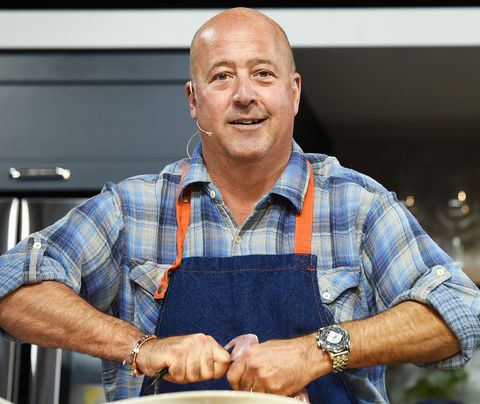
The whole “chefs are the new rock stars” axiom falls apart when you consider that these guys need to shake off the late-night shots of whiskey to wake up in the morning and run a business. And the restaurant business is tough, with low margins, high turnover, and increasing real estate and labor costs. Which helps explain why now, despite the persistent glorification of bad-boy chef behavior, some of the top names in the industry declare themselves alcohol– and drug-free. The reward for the hard, daily work of recovery? Often, it’s massive success, as is the case for the five chefs that MensHealth.com asked to describe their personal stories of recovery—and how it has affected their lives and work—in their own words (the interviews have been edited and condensed).
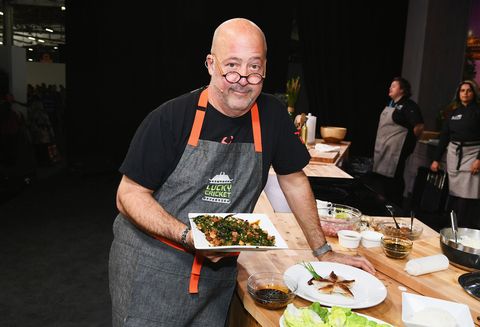
Getty ImagesDave Kotinsky
Andrew Zimmern, host of Bizarre Foods with Andrew Zimmern and other food and travel programs, media and culinary entrepreneur, and the restaurateur behind the forthcoming Minneapolis Chinese food restaurant Lucky Cricket, is 27 years sober.
Getting sober isn’t really about just putting corks in bottles. It’s about changing your life so that you have a sense of freedom and purpose and get out of the cycles of shame and trauma that for many of us were a big part of our story when we were using. To do that requires work. All I have is my own story and my own experience; I did it through treatment followed by a 12-step group. And 27 years later I still regularly attend, still do all the work in that 12-step group that is expected of me, and I work really hard.
If I wasn’t sober I couldn’t have done any of the things I’m known for. I’d definitely be dead. I had a very, very low bottom. I was an alcoholic, a drug addict, a homeless, abandoned-building-squatting thief the last year that I was using. I was 100 percent and completely a taker of things and a user of people.
My businesses and everything that I do I predicate on the principles of my recovery. If those principles performed miracles in my life and took me from the scrap heap to being ambulatory in life and having a chance at happiness, why wouldn’t I use them at work?
A lot of folks look at Bizarre Foods and think, “Oh it’s a show about a fat white guy who goes around the world and eats bugs.” That’s true. If they use the show as entertainment and if it is simply a way for them to relax after a day at work, fantastic. But the reason that I developed the show and the reason that I think it’s had a lot more staying power is that I wanted to create a vehicle to teach people about patience, tolerance, and understanding. I wanted to talk about things that unite us as human beings. Those ideas weren’t ones I learned in Civics class. I learned them the first year I got sober.
The reason I’m able to be successful and the reason I’m able to have a smile on my face and most of the time be a caring, kind compassionate human being is because of things that I never thought I would wind up doing in a million years, but I do because they make me a better person. In being a better person you end up being a better member of your community, a better father, friend, colleague.
That’s a powerful statement about the resurrection of a human being that was lost. And I was lost. Jails, institutions and death is how we [addicts] wind up. So if we could help human beings and restore them, you’re restoring families, communities, and businesses, and I think there’s no better use of my time in the world than being of service.
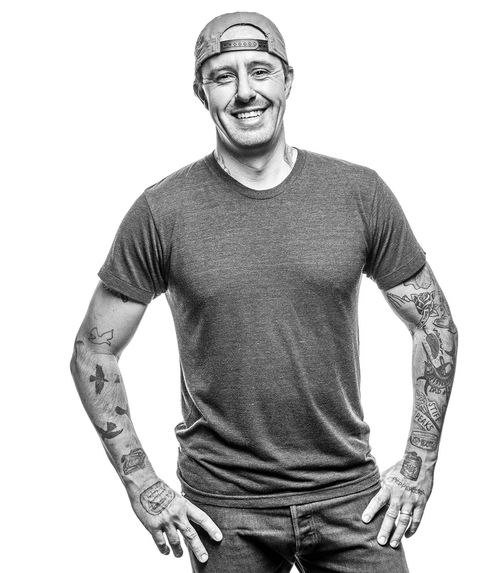
Stuart Mullenberg
Gabriel Rucker just celebrated his 5th anniversary of sobriety. The Portland chef and restaurateur behind Le Pigeon, Little Bird, and Canard recently created an Instagram account, @fitchefpdx, to showcase how working out and recovery drive him and to inspire others.
My life is better than it’s ever been. Life was really good beforehand for sure but I feel like I’m an all around better person in the healthy and sober life that I’m living now, the way I’m able to be as a husband, father, and chef.
For me, my path of sobriety is through using AA and the 12 Steps; those things are applicable to everything in life. So these days those are tools that I use when it comes to: “How do I deal with a mechanic that’s not telling me what I want to hear. How do I deal with an employee who’s late multiple times? How do I deal with deciding where I want to go to dinner with my wife?” All of these things that can cause tension, stress. T
here’s that and then I don’t smoke cigarettes anymore, I don’t drink. I wake up early. I’m at the gym by 4 a.m. boxing and working out six days a week. I take care of myself. I think about what I eat. My passions have switched from getting fucked up and partying to going to bed early, waking up and seeing what kind of circuit I can do.
The workload of staying sober is heavy. Like I only go to one meeting a week now, but I talk to my sponsor every day. I’m always practicing the 12th step, which is reaching out. I have a sponsee that I work with. I’m also communicating with my wife; there’ll be times where I’m like, Hey I could really use a meeting and she’ll acknowledge that. It was more difficult in the beginning because I went from this really selfish habit of being an alcoholic and a drunk to another selfish habit, which is getting sober. People don’t think about that very often. They’re like, well, you did such a good job getting sober, good for you!
I don’t want to be the poster boy for sobriety in my industry. But I did realize that I could be a good example. I could be a bad example, I could be no example or I could be a good example, and I figured I might as well be a good example.
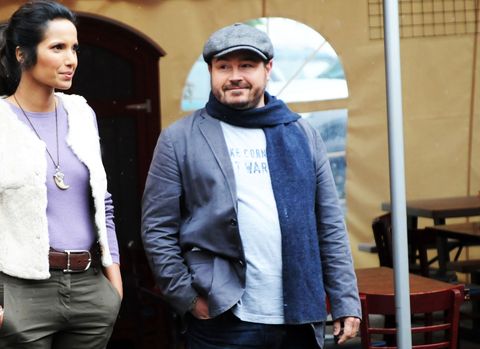
Getty ImagesBravo
Sean Brock announced his sobriety in a July 2017. He recently announced his departure from the Charleston-based restaurant group he built to focus on a new solo venture in his adopted hometown of Nashville.
The gift that I have is the ability to show that there’s a better way to live. I’m studying [the founder of the school of individual psychology] Alfred Adler right now. His theory is that it’s about courage, and if you’re unhappy, it’s your fault. You have the ability to make change every day.
I think one of the biggest lessons I’ve learned is that each day is a clean slate. It doesn’t matter what you did yesterday. It’s what’s happening right now and the fact that you have control over your happiness. That takes courage because you risk so much. A place of fear kept me sick for a long time. The moment I realized I had the ability to change my behavior, my perspective, how I handle each day—that opened the sky for me.
A lot of humility is involved. I’m literally doing an assessment of the day at the end of the night, and trying to make an inventory of what I could have done better, and what I did well.
One thing that I did that really helped me: I see a therapist, a counselor who specializes in a form of therapy called somatic experiencing. It is a way to repair unresolved trauma nerve pathways. I was able to do therapy in an environment when I was in a dream state and living through every restaurant opening I’ve ever done, and describing it, and purposefully triggering those neuropathways, and allowing my nervous system to go nuts.
[Before I became sober], I never went to therapy. I was too scared, man. I didn’t wanna get in there and start digging around. I didn’t want to admit my weaknesses. I didn’t want to start peeling the layers back because I knew how hard I’d been working my whole life to hide it.
I’m opening a pretty neat restaurant in Nashville where one of the big focuses will be creating a safe place for people to work. There’s going to be a full-on soundproof mindfulness room where I hope to share all of my daily practices with a team on how to stay centered and grounded and happy. There’ll be a classroom. It’s gonna be the restaurant I hope to retire in and be working in for the next 40 years. I want it to be a place that’s safe for me to go to as well.
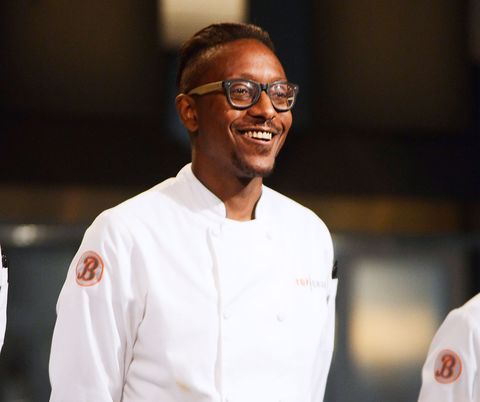
Getty ImagesBravo
Gregory Gourdet, who’ll celebrate 10 years sober early next year, owns Departure restaurants in Portland, OR, where he lives, and in Denver, CO, and has starred on Top Chef.
Another part of the story is how sobriety changes for people over years. When you’re trying to get sober or settling into being sober, you change so many parts about your life: the way you eat, the things you do, the time you fill with other activities besides drinking. It usually involves working out or something health-minded. I was super-aggressive about all that stuff in the first few years of being sober. I ran my first marathon a year into sobriety. I ran a few ultra milers. But as you get older, you—not get comfortable with sobriety—have it be more a normal part of who you are. You’re not trying so hard to avoid one thing and fill it with something else. Now, the restaurants have picked up quite a bit so I just work all the time. I feel like I still have alcoholic and addictive tendencies and instead of replacing them with hardcore running and dieting, now they’re just filled with more work. But I’m no less sober than I was a few years ago.
Health has been a huge factor. When you’re using and drinking constantly you don’t really care about your physical health. I think my career has been the most important thing that I’ve desired to maintain: be a better chef, a better leader in my community, a better teacher to the cooks that we get to work with. I’m definitely a workaholic. I could do a lot less but I still enjoy challenges and I still desire success in whatever form that may appear to be. Lately I’ve been trying to speak a lot about mental health in the chef community. I think we all find ourselves in a difficult career—restaurants are hard to run. As chefs, we find ourselves in this place where we’re working around the clock to make it all work. Oftentimes we put our mental health aside so the restaurant can run, so our cooks have what they need.
My definition of health has changed. I definitely run and work out a lot less but I’ve found so many more interests over the past five years of my sobriety, from sustainability to food policy. I have a voice in my community and in my country, and a lot of the political issues are actually food issues, and that has been a great platform for me to be able to express myself and learn and feel like I’m doing something for our country and our community.
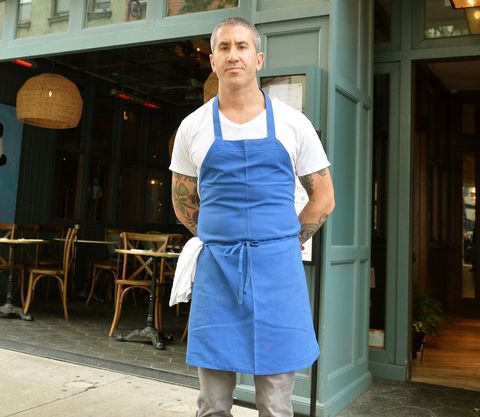
Getty ImagesNoam Galai
Michael Solomonov co-founded CookNSolo in Philadelphia with partner Steve Cook 10 years ago, and went into recovery for crack addiction and alcohol abuse after opening the company’s flagship modern Israeli restaurant Zahav. The group now includes several fast-casual concepts including the beloved donut and fried chicken chain Federal Donuts.
I try to meditate in the morning—that can be laying in bed or me wrapping Teffilin, which is a Jewish tradition. And I work out. I go to the boxing gym or I go for a run or in summertime I like to surf; that’s a nice way to focus on the present. Every morning I try to get myself back to the idea of oneness, and I know that sounds really cheesy but it’s trying to put unimportant things away. And practicing disciplined gratitude; that’s the big one. And then talking about how it is that I feel not just as it relates to drugs or alcohol but really trying to be forthcoming when it comes to what I’m feeling.
That can be at work—not trying to beat around the bush with my team about what I’m unhappy with. Resentment is not good at all. Resentment leads to relapse. And I try to go to a 12-step meeting once or twice a week. I’ll see a therapist once every other week. I surround myself with people that I genuinely love and I trust, that I can be honest with. That’s super helpful.
There’s no way I could have maintained any of this [pre-sobriety]. Everyone uses these terms like functioning alcoholic or drug addict. That works until it doesn’t work. But it’s much better now. Our policies in the restaurants are better too. It’s not like people who work here don’t get fucked up at all, but there’s no shift drinks; the culture of coming into work banged up is not something that we accept.
When I got clean I didn’t think I was going to be able to cook without wanting to get high. All of it is hard and it’s gotten so much easier. I just celebrated 10 years. It’s a really big fucking deal. I’ve gone through really hard times sober and clean but the one guarantee is that it only gets worse if I pick up. I don’t obsess over getting high or drinking but if I start to build up resentments or I start lying or let my ego or insecurities play a role in how I make decisions, it’s not a good thing.
At some point, your guard will be down and then maybe it starts with a drink, but for me as long as I don’t have that first drink, it doesn’t really matter. That’s the only control you really have. That first drink. After that, it’s fucking off to the races. I have no control. I am powerless. It was never like going out for a beer and then going to bed. It was never like, “Y’know, I’m gonna grab a bag of crack at like 9 p.m. and then I’ll smoke it and I’ll go home and go to sleep.” It starts with one and then seven hours later the sun is coming up and you’re like, “Oh my god I’m in Camden, New Jersey right now with like two strangers in the back of my car—what’s happening to me?!”
[Now that there’s a community of chefs in recovery], it feels amazing. There’s a place for us to go to now, a place for us to talk. All those ideas—like you could never be in the restaurant industry and be sober, or you could never own a restaurant and not drink—we’ve all gone through it. We’re trying to good for the world, for our community and our industry, and that is a very important part of any kind of program for recovery, is to try to give back and to help someone else to come through it. You’ve got people in our industry who are super successful that are talking about vulnerability and things that as a culture we swept under the rug for a very long time. There wasn’t a place to talk about this stuff before. And now there is.
Source: Read Full Article